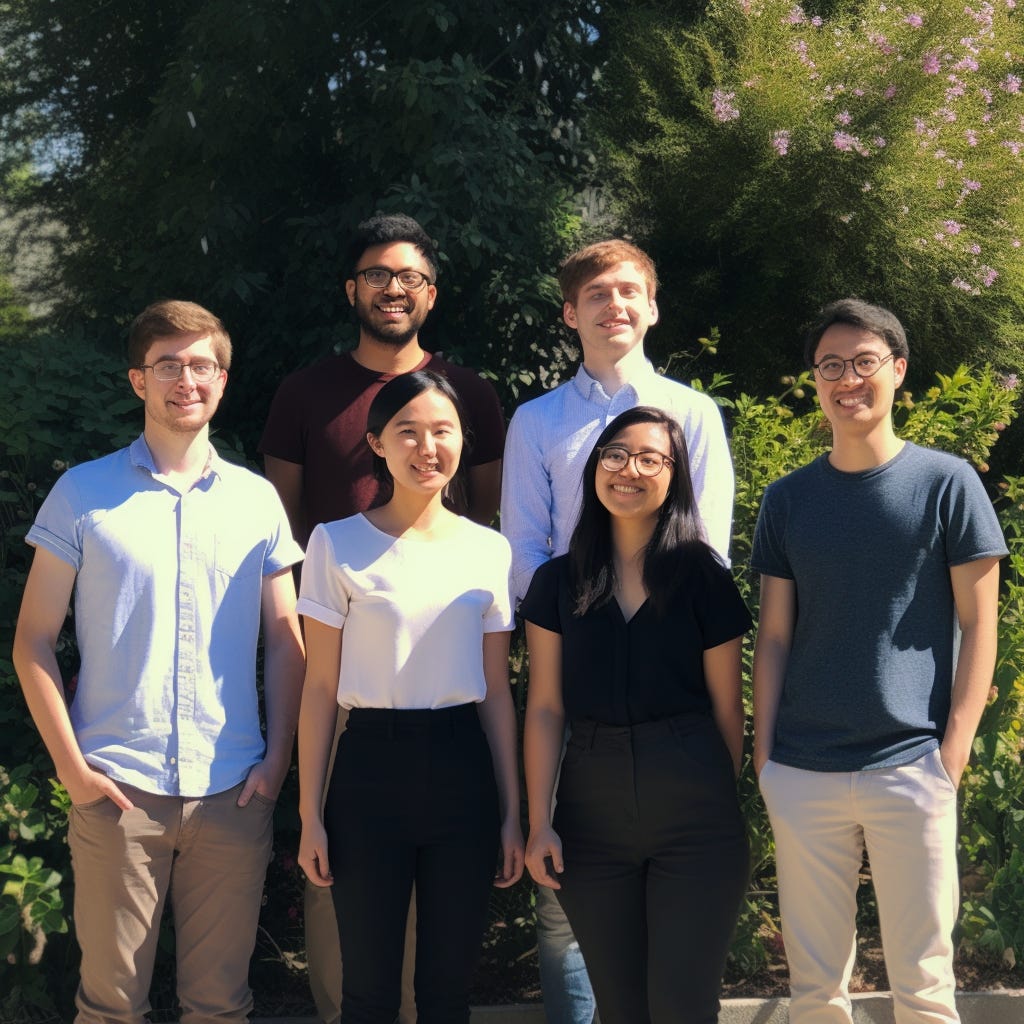Generative AI's winners and losers
Non-obvious insights into the future normal.
You’ve probably spent the last week watching countless shiny demo videos of what the endless new AIs can do for us. GPT-4! MidJourney v5! Bard! Firefly! Copilots!
But amid all the viral tweet roundups, there aren’t too many deeper explorations of what it means when generative AI is an ever-present part of our future normal.
That needs to change. Most readers here won’t just use AI. You lead teams and organizations that will deploy AI-powered products and services at scale. How should you be thinking about this epic paradigm shift?
This is something I’ll be diving into much deeper over the coming weeks, but as a start let’s look at a handful non-obvious winners and losers, and how they help us imagine the deeper implications of generative AI on how we live and work.
Winners.
Experts. The conventional wisdom is that we are all generalists now, and AI will empower non-experts. I wouldn’t be so sure. The online world was never as ‘flat’ as some predicted – the meteoric rise in super prime urban real estate prices over recent decades should be a powerful reminder that the world remains remarkably spiky. Democratization is not the same as equality. An abundance of noise means those who can separate out the signal (and identify plausible-looking hallucinations) will be increasingly valuable.

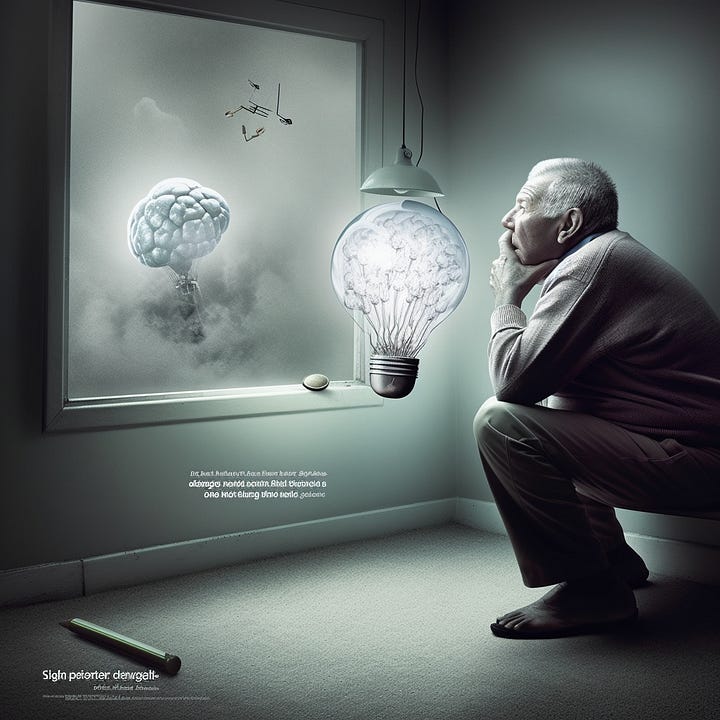
Creatives. Despite the clichés in the images above, I’m a firm believer in the power of human creativity. Indeed, the central idea in our SXSW keynote is a timeless one: “People who understand people always win.”
Correctly instructed, AI tools are incredible creative levers. They are tireless, expansive, and unencumbered by doubt or social pressure. But knowing what to ask is a skill. No I’m not talking about prompt engineering (jeez, do you need another article suggesting that this is the ‘job of the future’?!), but knowing what to even ask about. Those with an eclectic knowledge of history, art and literature will be able to coax AI in far more sophisticated and creative directions. The New Yorker recently published “The Death of the English Major”, which I believe will date as badly as Elizabeth Holmes’ infamous Fortune cover now that natural language is the programming language.
Offline events. If I’m honest, many of the sessions at SXSW were a disappointment. There was too much surface level observation, and not enough deep insight. But one thing that didn’t disappoint was the people I met. Austin was overflowing with an incredible concentration of smart people, many of whom I’ve followed online for years. It was thrilling to meet them and be able to have the conversations and debates that are hard to do online. As AI-generated content increases the volume of online content, and makes it near-impossible to know who or what is ‘real’, then the value of being face-to-face in person will increase exponentially.
Whatsapp (& other ‘dark social’ channels). Just as above, as the online world becomes saturated by even more synthetic content, people will turn to closed networks to know where to focus their attention. Of course, just as we’ve seen with social media, whether this shift to dark social counts as a win for society is by no means guaranteed. For every inspirational community that does good, there will be others that encourage polarisation and alienation.
Hard things. I found it deeply ironic that one of the first products using GPT-4 to hit the market was Duolingo’s AI-powered personalized language coaching. Why would anyone even learn a language, when AI-enabled real-time translation is just around the corner? I bet that while we will embrace that magical tech when it arrives, millions of us will still learn languages. Why? Because even with ChatGPT 7’s assistance, it will still be hard.
As a result, investing your time into learning a language will be an even more powerful signal of your respect for another human and their culture; the more ‘unnecessary’ it becomes, the more it will become a status symbol. We don’t ride horses to get places any more, but horse riding hasn’t gone extinct. Its function has changed.
Losers.



Dating apps. Let’s open the losers on a lighter note. Meeting online is now the most popular way to meet your partner. At the same time, even those most active on dating apps are increasingly questioning the ramifications of the infinite and instant optionality they offer. Now AI can enable even greater detachment – CupidBot will “swipe on girls that are just your type,” and then talk to matches until they agree to go on a date. After arranging a time and place to meet the app will even add the date into a user’s calendar.
While some might celebrate its dystopian “efficiency”, it’s not hard to see how this will inject a new level of skepticism into modern dating. If people start to question whether they are being wooed by a bot, they’ll migrate back to meeting IRL. Of course nothing is static – expect dating sites to be unlikely yet strong supporters of AI detectors.
Junior employees. Typically new technologies favor the young, who have the time and space to learn how to best use them. But AI chatbots are different. Not only are they simple to use (especially as much of the current complexity around prompts will soon be abstracted away), but they are best used by those with the experience and knowledge to know which bits of their output to focus on and which to discard. That’s not to say this paradigm shift won’t see new young winners emerge. But on a macro level, many Western societies are already near-gerentocracies. If AI copilots act as infinite interns for today’s managers then the traditional work trajectory (watch, learn, do, manage) will be largely closed off.
This will have two big implications. First, in the absence of more stable options, YOLO ‘careers’ (where 0.1% of people see extreme success, while most sink without trace) will become even more attractive. From Wall St Bets to Twitch and Onlyfans, 'work’ will look very different. Second, the 99.9% who don’t make it will feel even more disenchanted. If you thought the intergenerational strife of the past decade was bad, then get ready for what’s next.
DEI and women or any other “minority” groups. Perhaps stretching my claim to bring you non-obvious implications, but one that’s too important not to mention. LLMs are only as good as their training data, and we risk backsliding into the 1950s if we become wholly reliant on systems that perpetuate entrenched biases. Fortunately, this is widely recognized, and there are many people working hard to flag and correct this. For example, the images above come from the clever Miss Journey project (reader note: let’s make sure they end up as winners). Unfortunately we still aren’t taking these risks seriously enough – Microsoft laid off an entire team responsible for flagging AI’s harm to society. Wtf? 🤔
PS, even creating this newsletter I encountered this bias, when I gave Midjourney the following prompt “Expert at work“. Sigh.
The Future Normal is now.
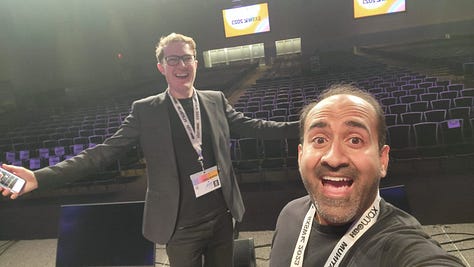
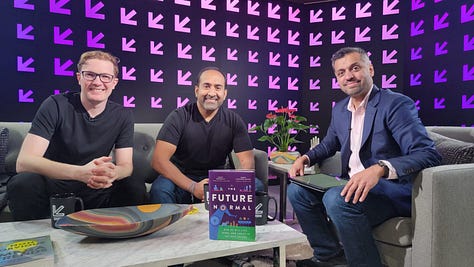


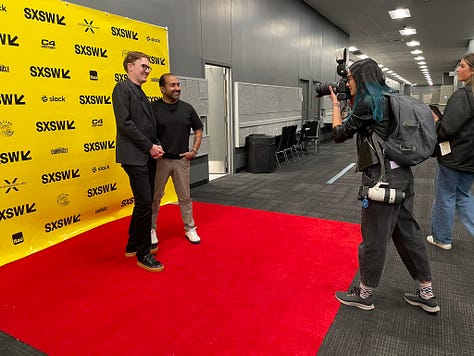
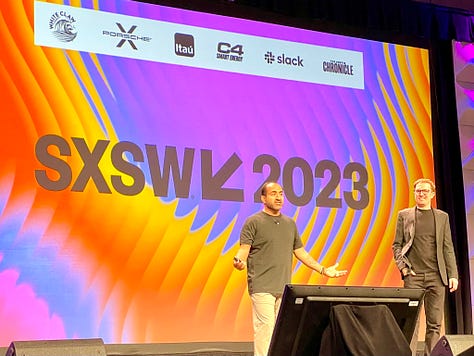
Delivering a new keynote to 2,500 people at SXSW with someone that I’d only met for the second time 36h before was intense, but fun.
And what a time to be at one of the world’s largest tech events…even a near-meltdown of the tech financial system barely tempered the irrational exuberance as we rode the AI hype train to the peak of inflated expectations and beyond.
It’s been a wild few weeks but the early feedback has been great. If you want to explore what our future normal could look like, then get in touch.
Thanks for reading,






